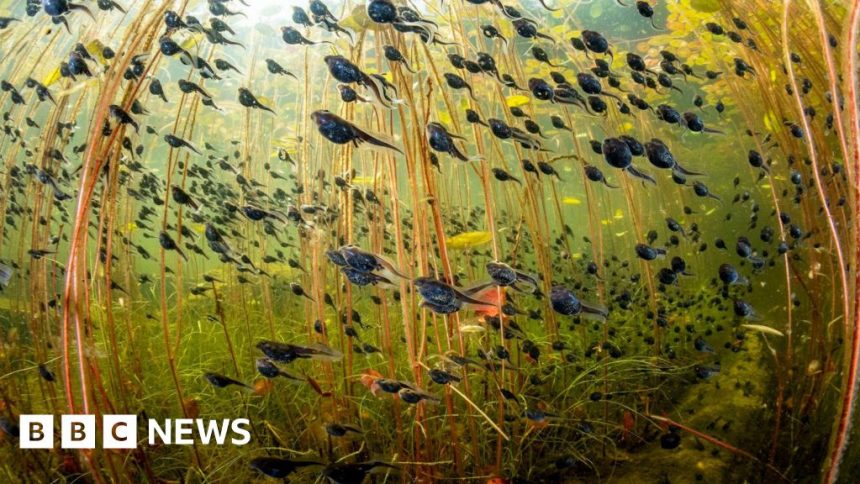Tadpoles steal show in wildlife photography contest
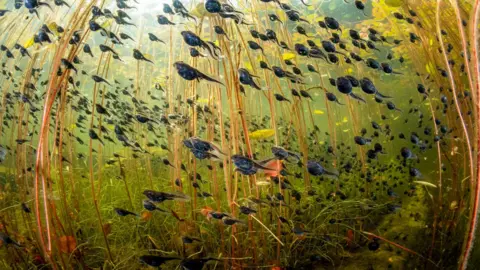 Shane Gross
Shane GrossA snapshot of wriggling toad tadpoles has earned Shane Gross the title of Wildlife Photographer of the Year.
Beneath a floating canopy of lily pads in Cedar Lake, Canada, a swarm of western toad tadpoles glided gracefully through the water.
“To me, the most fun that I can have, the thing that lights me up inside, is to see something new and try to photograph it in the best way I possibly can,” Shane told BBC News.
His careful movements through the delicate layer of silt and algae at the lake’s bottom ensured a clear view.
“I had no idea if I had anything good at all until I got home,” he said. “But when I finally looked, I was like, wow, this is pretty cool.”
Within four to twelve weeks after hatching, these little tadpoles begin their transformation into toads, with only about 1% making it to adulthood.
He was awarded the prize at London’s Natural History Museum.
“This image swirls with light, energy and a feeling of synchronised movement between the lilies and the tadpole tails,” said Kathy Moran, Jury Chair and Editor. “The real payoff is that this wonderful scene highlights environments and species that are often overlooked.”
Scroll on to see all of the winning photographs.
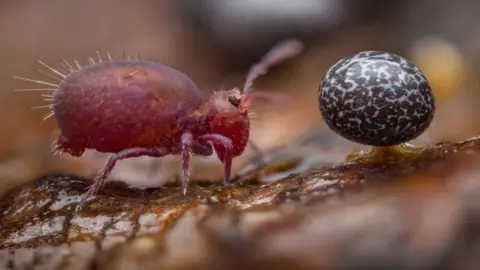 Alexis Tinker-Tsavalas
Alexis Tinker-TsavalasAlexis Tinker-Tsavalas, 17, from Germany, won the Young Wildlife Photographer of the Year title. His photo “Life Under Dead Wood” featured fruiting slime mould alongside a tiny, energetic springtail.
Working quickly was essential, as these tiny critters can leap several times their body length in the blink of an eye.
“I think a lot of people don’t know that these things even exist,” Alexis said. “If people learn more through my images, I feel like that’s one of the biggest goals for me, to just show this tiny world that a lot of people don’t really get to see, in a different light.”
Using a technique known as focus-stacking, he combined 36 images into one stunning photograph.
These miniature springtails, under two millimetres long, are found alongside slime moulds worldwide, munching on microorganisms and playing a key role in soil health.
Category winners
Dusting for New Evidence by Britta Jaschinski, Germany/UK
 Britta Jaschinski
Britta JaschinskiBritta Jaschinski observed as a crime scene investigator from London’s Metropolitan Police dusted a confiscated tusk at Heathrow Airport for fingerprints, using newly developed magnetic powder.
Under the Waterline by Matthew Smith, UK/Australia
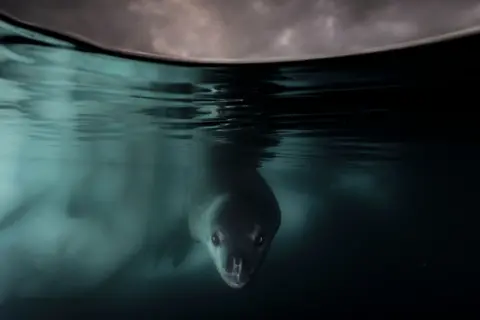 Matthew Smith
Matthew SmithMatthew Smith captured a striking split image of a curious leopard seal beneath the Antarctic ice, using a custom extension he designed for his camera’s underwater housing.
Dolphins of the Forest by Thomas Peschak, Germany/South Africa
 Thomas Peschak
Thomas PeschakThe Amazon River dolphin, one of two freshwater dolphin species in the Amazon and Orinoco basins, uniquely adapts to explore seasonally flooded forest habitats.
Thomas Peschak highlights the endangered dolphins’ complex relationship with local communities and the challenges they face due to human interactions that disrupt their natural behaviours.
Tiger in Town by Robin Darius Conz, Germany
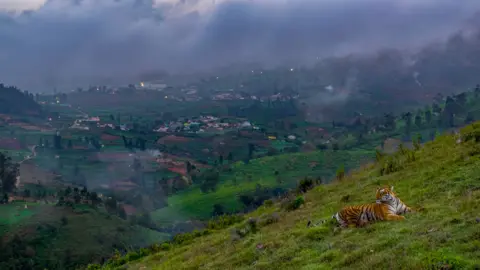 Robin Darius Conz
Robin Darius ConzWhile filming a wildlife documentary in India’s western ghats, Robin Darius Conz saw a tiger on a hillside overlooking a town. He used a drone to track the tiger, to highlight the contrast between protected areas and those affected by human development.
A Tranquil Moment by Hikkaduwa Liyanage Prasantha Vinod, Sri Lanka
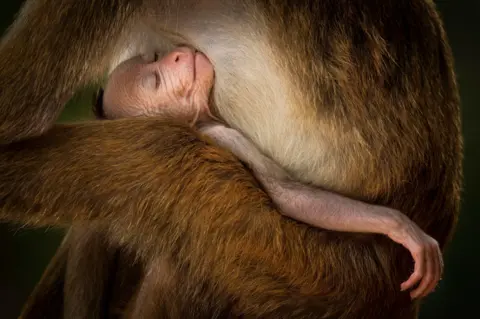 Hikkaduwa Liyanage Prasantha Vinod
Hikkaduwa Liyanage Prasantha VinodAfter photographing birds and leopards, Hikkaduwa Liyanage Prasantha Vinod captured a young toque macaque peacefully sleeping in an adult’s arms to highlight the challenges these monkeys face amid habitat loss and farmer conflicts.
The Demolition Squad by Ingo Arndt, Germany
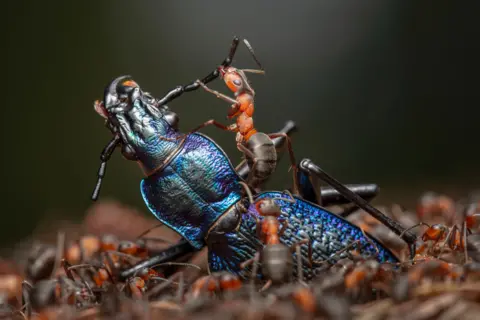 Ingo Arndt
Ingo ArndtIngo Arndt captured the red wood ants efficiently dismembering a blue ground beetle to carry into their nest. He described himself as “full of ant” after just a few minutes lying beside the ants’ nest as he watched their teamwork in action.
Free as a Bird by Alberto Román Gómez, Spain
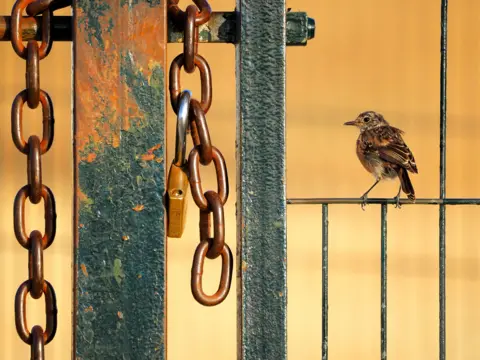 Alberto Román Gómez
Alberto Román GómezAlberto Román Gómez captured a playful stonechat perched beside a heavy chain, resembling a tiny warrior. From his father’s car in Sierra de Grazalema Natural Park, he struggled to photograph the bird as it darted about, gathering insects.
Frontier of the Lynx by Igor Metelskiy, Russia
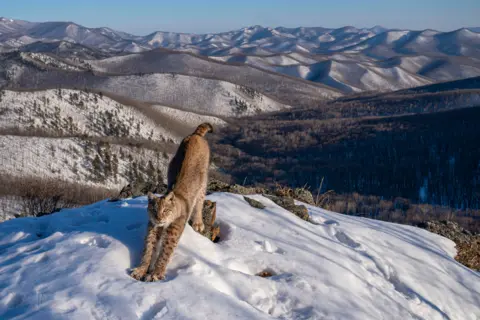 Igor Metelskiy
Igor MetelskiyMr Metelskiy captured a serene image of a lynx stretching in the evening sun, blending into the wilderness. After over six months of patience, he positioned his camera trap near the footprints of potential prey, revealing the elusive lynx in its natural habitat.
Old Man of the Glen by Fortunato Gatto, Italy
 Fortunato Gatto
Fortunato GattoFortunato Gatto came across a gnarled birch tree draped with pale ‘old man’s beard’ lichens in Glen Affric in the Scottish highlands. Glen Affric is home to the highest concentration of native trees in the UK, making it a vital ecosystem.
Practice Makes Perfect by Jack Zhi, USA
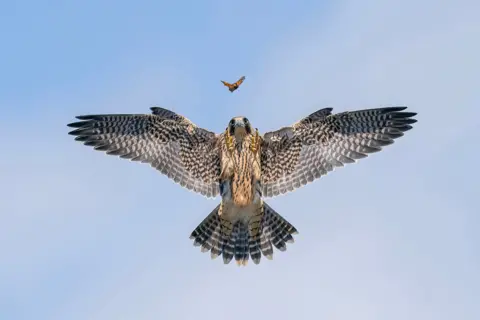 Jack Zhi
Jack Zhi Jack Zhi captures a young falcon practicing hunting on a butterfly near its sea-cliff nest. For the past eight years, he observed the birds in this area, but tracking them was particularly challenging as they were so fast.
The Artful Crow by Jiří Hřebíček, Czech Republic
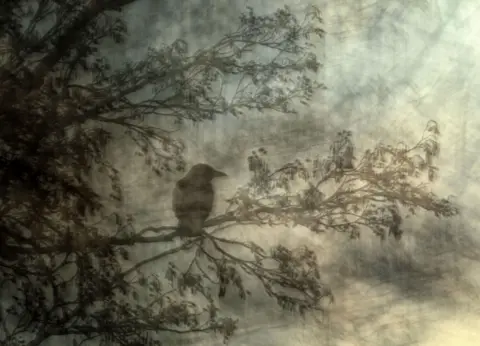 Jiří Hřebíček
Jiří HřebíčekJiří Hřebíček created an artistic image of a carrion crow by using a long shutter speed while moving his camera on purpose.
On Watch by John E Marriott, Canada
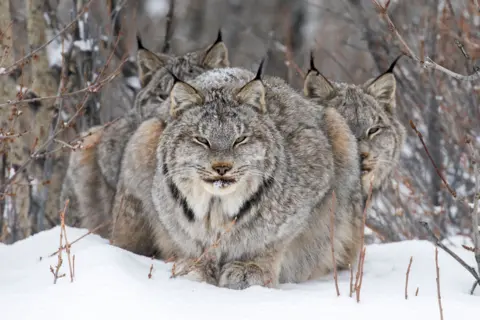 John E Marriott
John E MarriottJohn Marriott photographs a lynx resting, with its fully grown young sheltering from the cold wind behind it. After a week of tracking led him to the group, he kept his distance to avoid disturbing the family in the snowy forest.
A Diet of Deadly Plastic by Justin Gilligan, Australia
 Justin Gilligan
Justin GilliganJustin Gilligan created a mosaic from 403 pieces of plastic found in the digestive tract of a dead flesh-footed shearwater. He has been documenting research from a team that studies the impact of plastic pollution on marine ecosystems.
An Evening Meal by Parham Pourahmad, USA
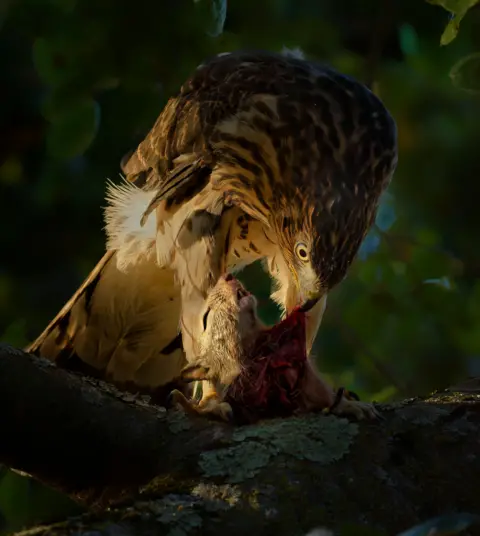 Parham Pourahmad
Parham PourahmadParham Pourahmad watched the last rays of sunlight highlight a young Cooper’s hawk eating a squirrel. Over the summer, he photographed wildlife in a city park to show that “nature will always be wild and unpredictable”.
Wetland Wrestle by Karine Aigner, USA
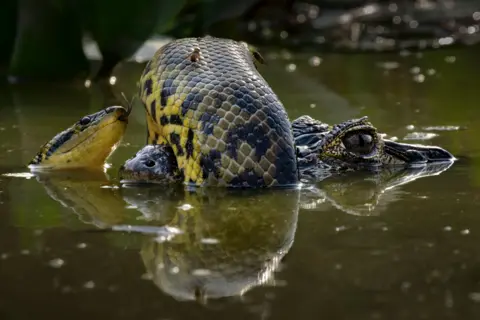 Karine Aigner
Karine AignerKarine Aigner spotted a yellow anaconda coiled around the snout of a yacaré caiman while leading a tour group. She observed the two reptiles struggling, uncertain which was the aggressor, while horseflies clung to the snake’s back.
The Serengeti of the Sea by Sage Ono, USA
 Sage Ono
Sage OnoTube-snout fish eggs glimmer among golden kelp, their colours fading as they develop. Sage Ono, inspired by his grandfather’s marine biology stories, captures the unique underwater life of Monterey Bay’s giant kelp forests.
“I like small and weird. So, when I saw the eggs and the kelp, I was like, okay, this is something I don’t have a photograph of. I’ve never really seen a photograph of it, so it’s really interesting to me.” Sage said.
The annual exhibition dedicated to the WPY competition opens at the Natural History Museum on Friday.



